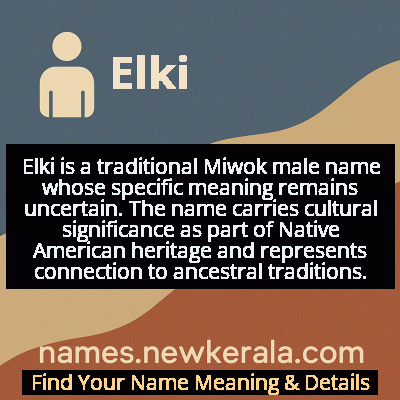Elki Name Meaning & Details
Origin, Popularity, Numerology Analysis & Name Meaning of Elki
Discover the origin, meaning, and cultural significance of the name ELKI. Delve into its historical roots and explore the lasting impact it has had on communities and traditions.
Name
Elki
Gender
Male
Origin
Native
Lucky Number
1
Meaning of the Name - Elki
Elki is a traditional Miwok male name whose specific meaning remains uncertain. The name carries cultural significance as part of Native American heritage and represents connection to ancestral traditions.
Elki - Complete Numerology Analysis
Your Numerology Number
Based on Pythagorean Numerology System
Ruling Planet
Sun
Positive Nature
Leaders, ambitious, highly driven, self-reliant, innovative.
Negative Traits
Overly aggressive, domineering, impatient, selfish.
Lucky Colours
Red, orange, gold.
Lucky Days
Sunday.
Lucky Stones
Ruby, garnet.
Harmony Numbers
2, 3, 9.
Best Suited Professions
Entrepreneurs, managers, engineers.
What People Like About You
Courage, determination, leadership.
Famous People Named Elki
Elki Funmaker
Ho-Chunk artist and educator
Renowned for traditional Native American beadwork and cultural preservation efforts
Elki Little Bear
Cultural preservationist
Documented Miwok traditions and language for future generations
Elki Running Deer
Environmental activist
Led conservation efforts for ancestral Miwok lands in California
Name Variations & International Equivalents
Click on blue names to explore their detailed meanings. Gray names with will be available soon.
Cultural & Historical Significance
In contemporary times, names like Elki have gained significance as symbols of cultural resilience and the ongoing preservation of Native American identities despite historical challenges and assimilation pressures. The name represents more than just personal identity—it embodies the survival of indigenous knowledge systems, language revitalization efforts, and the reclamation of cultural practices that were nearly lost. For modern Miwok communities, choosing traditional names like Elki is an act of cultural affirmation and a statement about the continuity of their heritage in the 21st century.
Extended Personality Analysis
Individuals named Elki are often perceived as deeply connected to nature and possessing a strong sense of heritage. They typically exhibit qualities of resilience, adaptability, and quiet strength—characteristics that reflect the enduring spirit of indigenous cultures. These individuals tend to be observant, thoughtful, and grounded, with an innate understanding of natural cycles and community interdependence. Their personality often blends traditional wisdom with contemporary awareness, making them effective bridges between cultural preservation and modern life.
Elki-named individuals frequently demonstrate loyalty to family and community, showing protective instincts toward those they care about and the values they hold dear. They tend to approach challenges with patience and perseverance, drawing strength from their cultural roots while navigating contemporary society. There's often a spiritual depth to their character, with an appreciation for tradition balanced by practical adaptability. Their strong connection to heritage gives them a sense of purpose and identity that guides their decisions and relationships, making them reliable and deeply principled individuals who honor both their personal journey and their cultural legacy.
Modern Usage & Popularity
In contemporary usage, Elki remains a relatively rare name primarily used within Native American communities, particularly among Miwok descendants seeking to honor their heritage. The name has seen a slight increase in usage as part of the broader movement toward cultural reclamation and indigenous identity affirmation. While not appearing on mainstream popularity charts, Elki represents an important choice for families wanting to maintain cultural continuity and resist the erosion of traditional naming practices. The name is occasionally adopted by non-Native individuals who appreciate its unique sound and cultural significance, though this practice is approached with careful consideration of cultural appropriation concerns. Overall, Elki maintains its status as a culturally significant name rather than a trending fashionable choice, serving as a meaningful connection to Miwok heritage in an increasingly globalized world.
Symbolic & Spiritual Meanings
Symbolically, Elki represents connection to ancestral roots, cultural resilience, and harmony with the natural world. The name evokes images of enduring strength and the continuity of tradition across generations. It symbolizes the bridge between past and present, carrying forward the wisdom and spirit of indigenous ancestors while adapting to contemporary realities. Elki also embodies the concept of stewardship—caring for cultural heritage, language, and the environment as interconnected responsibilities. The name suggests a deep-rooted identity that withstands external pressures and maintains its essential character through changing circumstances. In a broader sense, Elki represents the survival and revitalization of indigenous cultures in the modern world, serving as a testament to the persistence of traditional knowledge and the ongoing journey of cultural reclamation.

